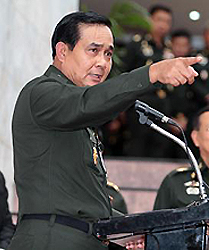Israel and Iran Agree on Nuclear Ambiguity by Pierre Klochendler -- Antiwar.comPierre Klochendler, February 07, 2012
JERUSALEM – Will Israel attack Iran’s nuclear facilities this spring? That is a question dominating the international agenda. Meanwhile, the grand project of a nuclear weapon–free Middle East is relegated to the utopian “day after” a solution is found to the Islamic republic’s atomic program.
Strangely enough, Israeli public opinion has no clear opinion on the subject, and relies on “those who know best.” “Those who know best,” like Defense Minister Ehud Barak, say, “Should sanctions fail to stop Iran’s nuclear program, there’ll be a need to consider taking action.”
“Whoever says ‘later’ could find that it’s too late,” he warned last week.
The concern shared by many defense analysts, including Israelis, is that an Israeli strike would not only unleash a terrible all-out war, but would only set Iran’s nuclear program back by just a few years.
“Tough sanctions and a united diplomatic front are the best chance for crippling Iran’s nuclear program,” urged a New York Times op-ed on Friday.
On the other hand, Israeli defense officials have expressed concern that should the Iranian nuclear issue not be tackled head-on — either financially or militarily — the region would plunge into nuclear-proliferation chaos, with potential leakage to non-actor states.
Such are the parameters of the debate: either an attack — with or without U.S. endorsement — or sanctions. What about alternatives, like the radical idea of a nuclear weapon–free zone (NWFZ) as a strategy to neutralize Iran’s nuclear program?
Israeli governments have conditioned a regional NWFZ on achieving comprehensive peace with all of Israel’s neighbors. This is virtually impossible given the current character of the Iranian regime. And there’s no progress on the Arab peace front.
Yet civil society activists take succor from the fact that following the 2010 Nuclear Non-Proliferation Treaty (NPT) Review Conference, a follow-up conference will be convened this year in Finland.
The gathering will discuss an agreement on how to transform the region into a NWFZ and free of all other weapons of mass destruction. The host country has been accepted by all governments, including both Israel and Iran. “Most Israelis aren’t even aware that their country’s willing to contemplate the NWFZ idea,” emphasizes Hillel Schenker, co-editor of the Palestine-Israel Journal, a Jerusalem-based quarterly run by both Israeli and Palestinian experts.
Last October, the former spokesperson for the Israeli branch of International Physicians for the Prevention of Nuclear War coordinated a meeting between Israeli and Iranian activists. Held in London under the auspices of a civil society initiative to establish a Conference on Security and Cooperation in the Middle East, the meeting facilitated the development of areas of mutual understanding between both peoples.
Such meeting is exceptional. By and large, public discussion is stifled by pressure at the helm. When ex-Mossad spy agency chief Meir Dagan questioned the judgment of Israel’s leaders that a military solution exists, Barak attacked his outspokenness, calling it “serious behavior.”
Usually open to debate, Israelis tend to consider the nuclear question taboo or too complex for expressing dissenting opinions. It’s fine by most that only top acting political and military leaders assume that right, only in closed forums. Any relevant information in Hebrew is rare; information in English is abundant but arduous to analyze.
The absence of discussion stems also from the fact that, since the inception of its own nuclear program in the late 1950s, Israel has officially stuck to a policy of “ambiguity”: it “won’t be the first country to introduce nuclear weapons in the region” is the official posture.
Israel is not an NPT signatory; Iran is. But both countries reject and refrain from any linkage between their respective nuclear programs.
The secrecy shrouding their country’s programs enables Israelis to feel that they participate in the defense of their state without having to grapple with its nuclear choices.
“If we as a society give any thought to nuclear weapons, it’s to Iran’s, which hasn’t yet become a reality,” notes Sharon Dolev, Greenpeace Mediterranean disarmament campaigner. “Like the hunchback who doesn’t see his hump, we don’t see our own weapons.”
Ambiguity therefore means that the international community should continue to ignore Dimona, believed to be the center of the Israeli nuclear program, and focus solely on Natanz, said to be the nerve center of the Iranian nuclear program.
Likewise, Iran is ambiguous with regard to its nuclear quest. While the International Atomic Energy Agency reported in November that Iran has engaged in activities related to the development of nuclear weapons, there’s no “smoking gun” as to a decision to actually develop a bomb.
Israeli government officials praise “ambiguity” as it enhances Israel’s security almost as much as WMDs. Assuming such a policy is necessary, nuclear demilitarization activists propose a debate that would respect the constraints of not exposing Israel’s nuclear capability. Such discussion would strengthen the democratic character of their society.
“It’s still possible, even obligatory, to hold serious discussions about the need for nuclear weapons, the dangers they present regionally and globally, and the various possibilities for disarmament,” says Dolev.
Advocates of the abolition of Israel’s “nuclear opacity” believe that calling a spade a spade could gradually open the region towards arms control, if not creating a NWFZ.
“But if prevention [of Iran’s nuclear capability] fails, it’s unlikely that Israelis would look to arms control as a solution,” predicts Avner Cohen, author of the controversial Israel and the Bomb (1998). All the more so given that during the Cold War, the backdrop to arms-control dialogues was the declared existence of nuclear weapons.
Besides, Israelis almost consensually consider nuclear ambiguity as a case of force majeure, the most effective deterrent to what’s widely perceived here as the “existential threat” posed by Iran.
This linkage approach between WMDs and extreme hostility, advocates of denuclearization concede, takes precedence over all other considerations. Supposing Iran develops a bomb, “we don’t know which nuclear-weapons state will disarm first, we do know which will disarm last. That country is Israel,” says Cohen.
Many civil society activists conclude that it’s probably already too late for Israelis to convince their leaders that getting out of the “ambiguity” bunker might defuse the Iranian time-bomb that’s already ticking dangerously.
(Inter Press Service)









 National army chief Prayuth Chan-ocha (Photo by Chanat Katanyu)
National army chief Prayuth Chan-ocha (Photo by Chanat Katanyu) Democrat Party leader and former prime minister Abhisit Vejjajiva (Photo by Patipat Janthong)
Democrat Party leader and former prime minister Abhisit Vejjajiva (Photo by Patipat Janthong)






